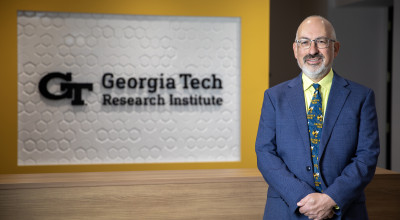
Amid growing concerns about climate change and the need for sustainable business practices, the commercial real estate market stands as a key player in shaping a greener future.
But the absence of a standardized framework for scoring sustainability in commercial real estate has led to a fragmented landscape, with many different standards and rating mechanisms being developed independently by small firms.
To address this challenge, the Georgia Tech Research Institute (GTRI) is developing an environmental, social, and governance (ESG) scoring system for the U.S. commercial real estate market, similar to a credit score, that stakeholders could use to measure and compare different buildings and properties against. The ultimate goal is to establish national acceptance for this framework.
“ESG scoring and sustainable real estate are two topics that are really taking off right now, but at this point, they’re still the wild west,” said GTRI Principal Research Scientist Ilan Stern, who is leading this project. “While there are a number of ESG scoring and rating mechanisms out there, none of them have been nationally or internationally accepted.”
In the U.S., LEED, or Leadership in Energy and Environmental Design, is the most widely used green building certification program overseen by the United States Green Building Council (USGBC).
Buildings earn LEED certification by accruing LEED points across nine categories, such as location and transportation, sustainable sites, water efficiency, energy and atmosphere, and material and resources, with Platinum being the highest rating.
Another common system used for evaluating sustainability efforts in the commercial real estate market is Global Real Estate Sustainability Benchmark (GRESB). GRESB provides ESG data to financial markets and conducts assessments for real estate managers that identifies areas for improvement and ways for them to engage with investors.
“These existing standards address the ‘E’ in ESG very well, but the social and governance aspects are still in development, which is our primary focus,” said Paula Gomez, a GTRI senior research engineer who is co-leading this project. “We’re not just examining the building itself but also its broader surroundings, considering factors like safety and walkability.”
GTRI’s scoring system for governance would assess whether properties are complying with new regulations and policies.
“Our goal is to develop an algorithm for measuring and comparing buildings and properties based on a standardized score and ultimately achieve national acceptance for it,” Gomez said.
To date, the U.S. has been perceived as lagging its global counterparts in ESG initiatives, particularly the EU and U.K., where investor, political and societal support is stronger. U.S. federal agencies have also been slower to propose regulations in this sphere.
For this project, GTRI has partnered with a U.S. commercial real estate database that provides educational courses for real estate professionals, including certifications for becoming ESG realtors.
GTRI is developing course content for this partner to equip real estate agents and developers with knowledge about its standardized scoring system and its implications for insurance coverage and project costs.
“This project directly relates to GTRI’s mission of improving the human condition through sustainability,” Stern said. “This is also unchartered territory for GTRI and the opportunity for us to open new doors in energy and sustainability is really exciting.”
Writer: Anna Akins
Photos: Sean McNeil
GTRI Communications
Georgia Tech Research Institute
Atlanta, Georgia
The Georgia Tech Research Institute (GTRI) is the nonprofit, applied research division of the Georgia Institute of Technology (Georgia Tech). Founded in 1934 as the Engineering Experiment Station, GTRI has grown to more than 2,900 employees, supporting eight laboratories in over 20 locations around the country and performing more than $940 million of problem-solving research annually for government and industry. GTRI's renowned researchers combine science, engineering, economics, policy, and technical expertise to solve complex problems for the U.S. federal government, state, and industry.




